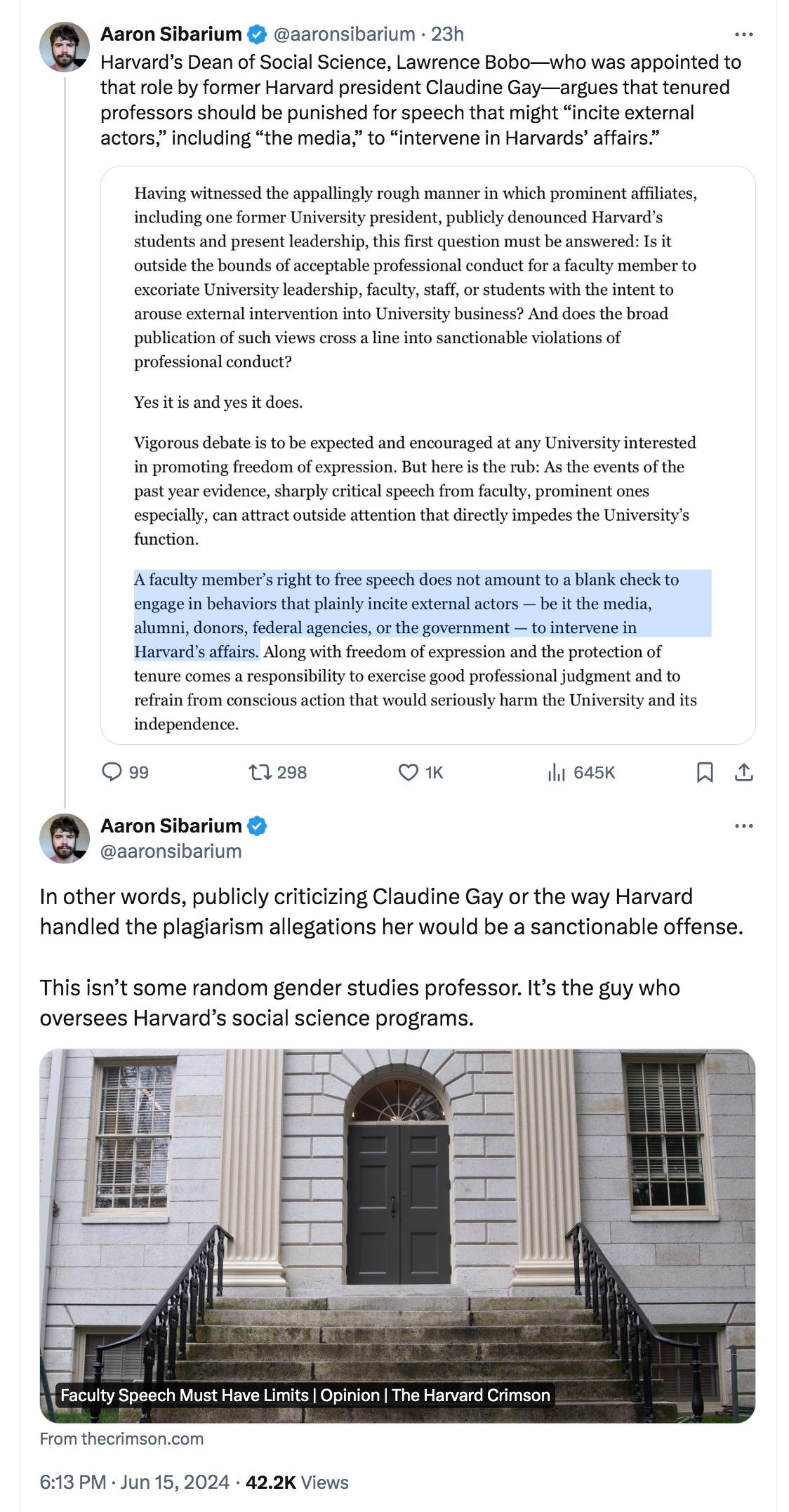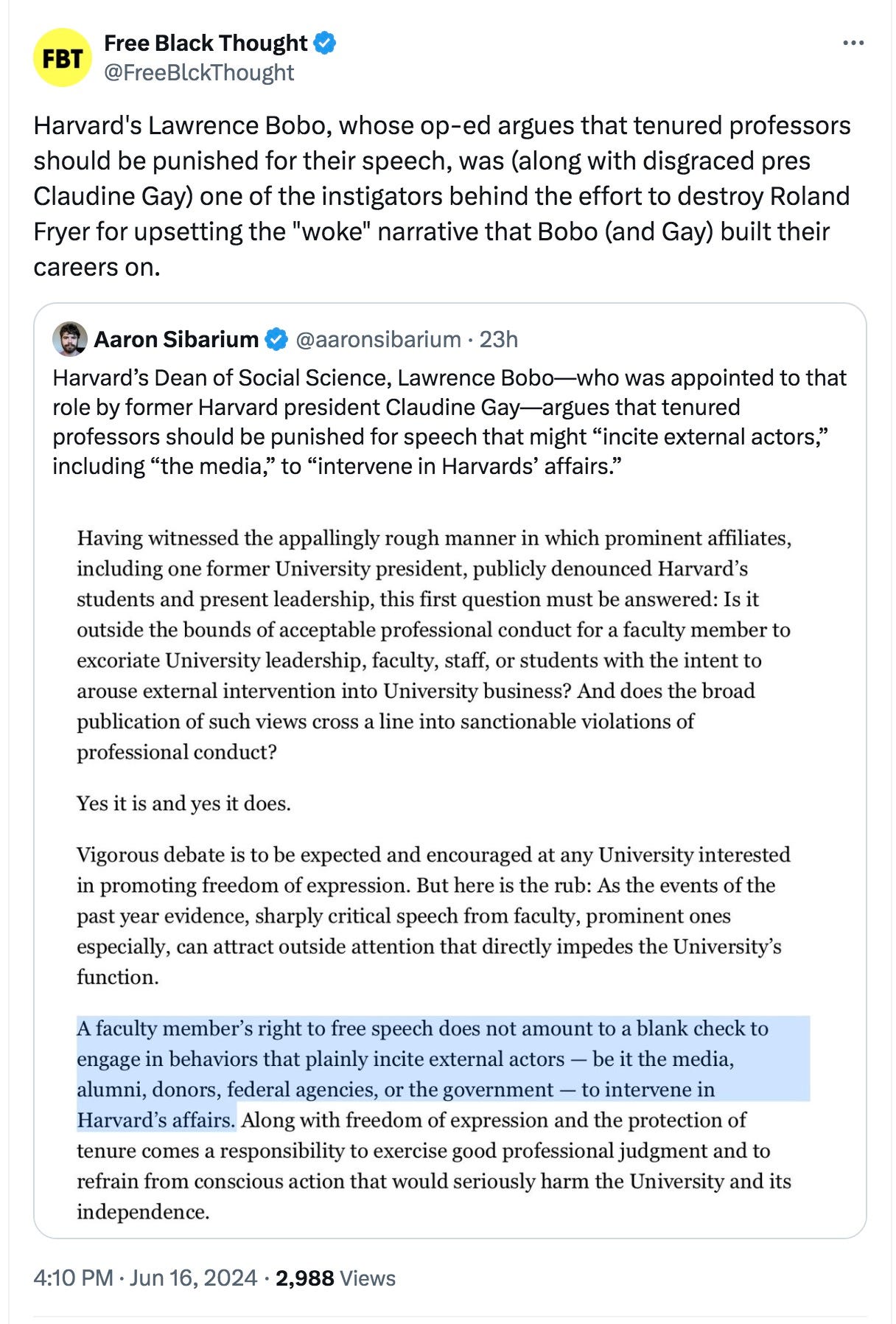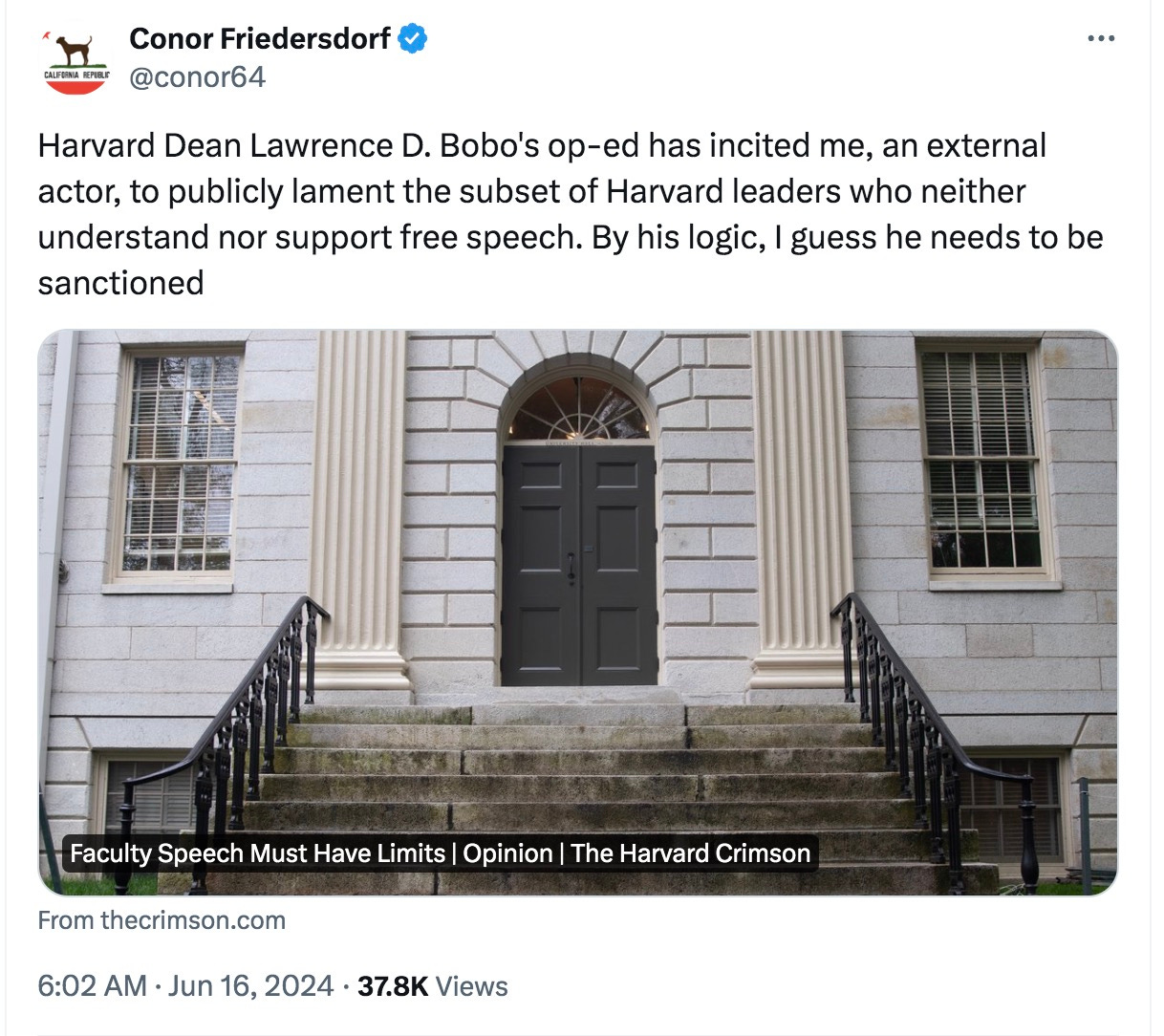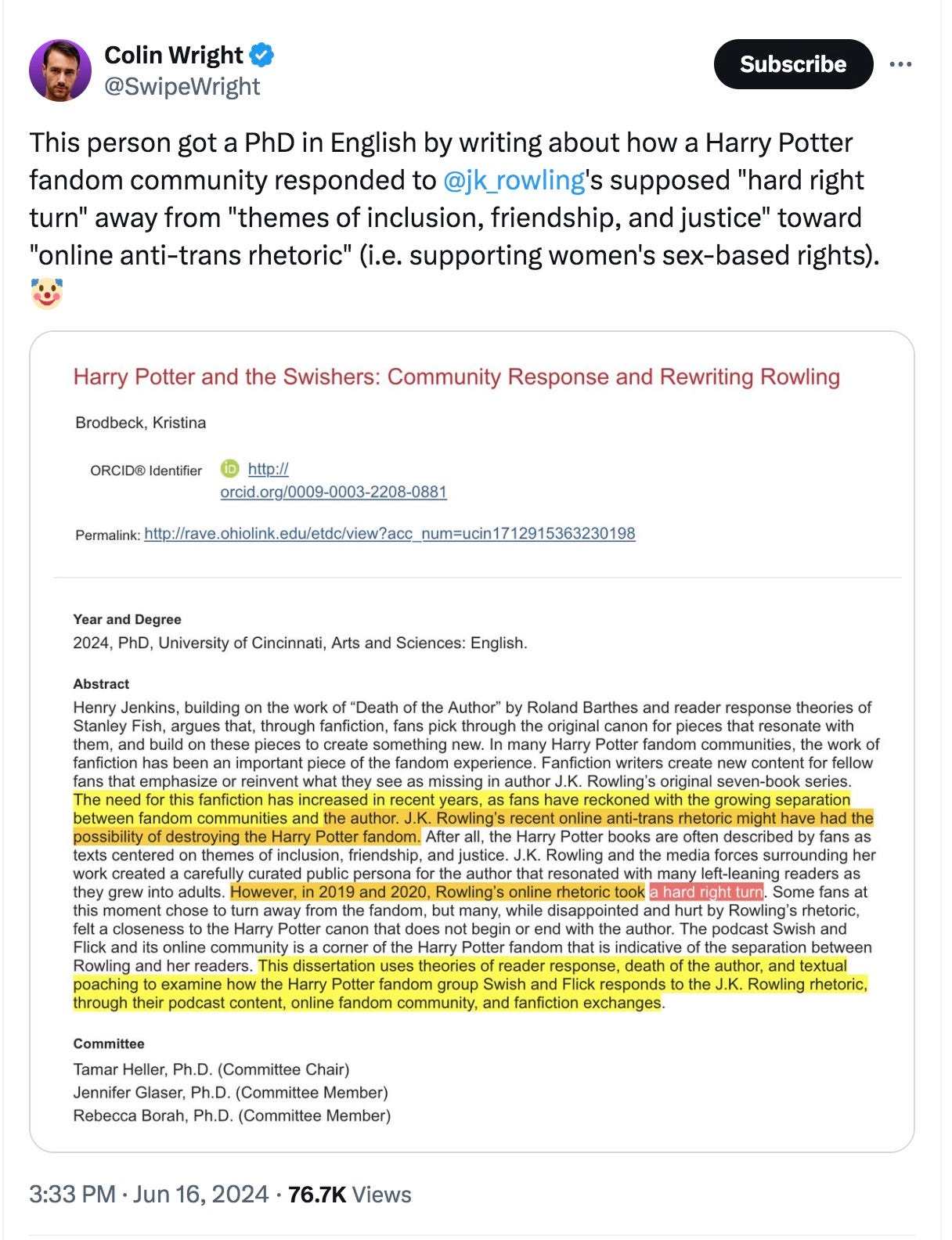E-Pluribus | June 17, 2024
Gender identity issues in children can be a phase, new study finds; why persuade when you can indoctrinate? And the Constitution as a unifying force.
A round-up of the latest and best musings on the rise of illiberalism in the public discourse:
Christina Buttons : Just a Phase: Most German Youth Outgrow Gender Identity Issues
Colin Wright’s Reality’s Last Stand continues to be an outlet for science-based news the mainstream seems reluctant to publish. At the site, Christina Buttons reports on a study from Germany you may have missed.
A new long-term study from Germany suggests that the majority of young people diagnosed with gender identity disorders do not continue to identify as such over time. The study examined insurance data over five years, revealing that more than half of young people aged 5-24 across every age subgroup diagnosed with "gender identity disorder" no longer had the diagnosis after five years. Specifically, the desistance rate was 72.7% in 15- to 19-year-old females and 50.3% in 20- to 24-year-old males. Among the whole group of 5- to 24-year-olds, only about 36.4% of those diagnosed in 2017 still had the diagnosis five years later, indicating that more than 63% desisted.
One of the strengths of this study is its comprehensive collection of outpatient billing data for all legally insured persons in Germany, providing a large and representative sample. Additionally, the long observation period from 2013 to 2022 offers valuable insights into long-term trends and changes in diagnosis rates.
The research also noted a dramatic rise in the number of young people being diagnosed with gender identity disorders. In 2013, there were 22.5 cases per 100,000 insured young people, but by 2022, this had increased to 175.7 cases per 100,000, representing an increase of nearly 681%. The study highlighted that, in almost all years, the highest prevalence of gender identity disorder diagnoses was found in 15- to 19-year-old females. In 2022, this age group had a prevalence rate of 452.6 cases per 100,000.
The study also found that a large majority of those diagnosed with gender identity disorders had other mental health conditions. In 2022, 72.4% of individuals with a gender identity disorder diagnosis had at least one other psychiatric diagnosis. The most common co-occurring mental health issues included depressive disorders (affecting about 57.5% of females and 49.3% of males), anxiety disorders (34% of females and 23.5% of males), and borderline personality disorders (17.6% of females and 12.1% of males). Other frequent conditions were attention deficit/hyperactivity disorder (ADHD) and post-traumatic stress disorder (PTSD).
[. . .]
The results of this study are a significant finding—there is very little desistance data on the newer cohort of young people under the gender-affirming model of care, and this study adds to growing evidence that for many young people, a trans-identity can be a temporary phase.
Read it all here.
Louis Galarowicz: “Indoctrinate” New Hires
“Indoctrinate” strikes most as a pejorative term. But according to Louis Galarowicz at City Journal, when it comes to DEI, the University of Oregon set indoctrination as an explicit goal.
In the fall of 2021, the University of Oregon psychology department petitioned the school to hire an “Assistant Professor with a dedicated research focus in diversity/inclusion-related . . . clinical issues.” The department claimed that its proposal was consistent with the “campus-wide initiative towards enhancing the diversity-related research and teaching” and the “university’s core values,” among which were “diversity and seek[ing] to foster equity and inclusion.”
The psychology department was right—diversity, equity, and inclusion are “core values” at the University of Oregon. According to a trove of documents obtained by the National Association of Scholars, Oregon staff are integrating DEI criteria into their hiring protocols and seeking to “indoctrinate” new hires in diversity ideology.
The University of Oregon requires all departments seeking to hire new faculty to create an “Institutional Hiring Proposal” to defend the need for a new employee. A template is provided, with a series of questions about the proposed position. Notably, the template requires every department to address concerns related to “diversity, equity, and inclusion.” The template’s DEI section first asks departments to review the relevant “Field Availability Estimates” data, which breaks down the gender and racial demographics of terminal-degree holders in each academic subject. Conducting an FAE review, according to the provost’s office, is an “[e]xpected [p]ractice” to ensure “strong, diverse applicant pools.” After looking at that data, the template prompts departments to outline the “robust active recruitment work” they intend to pursue in furtherance of DEI goals, and how they will overcome “potential challenges.”
These prompts apparently inspired departments to consider the racial composition of potential applicant pools when proposing new roles. The psychology department, for example, highlighted how it had sought to hire within “the specific subfield of clinical diversity science,” since that specialty would be more likely to “attract excellent minority candidates.” The sociology department similarly noted that it would “target recruitment efforts heavily in the subfield of environmental/public health with the goal of [attracting] a more racially inclusive applicant pool.” Remarkably, the indigenous studies department lamented that the university “doesn’t have a single tenure-track faculty member who is Pacific Islander,” and noted that its new proposed faculty role “would give us an opportunity to fill a glaring need.”
Read the whole thing.
Barton Swaim with Yuval Levin: Can the Constitution Reconcile America?
E pluribus unum (forgive me if I am partial to the phrase) is both the reality of how the United States came to be and aspirational for how the country should function, but often we are not “one.” At the Wall Street Journal, Barton Swaim spoke with Yuval Levin about how the Constitution, the document that established the foundation of our republic (and itself a source of some of our contention,) properly understood, can help bridge the divides that exist in our politics today.
[Yuval] Levin has a gift for drawing readers’ attention to realities that should have been obvious but weren’t. He does that in his latest book, “American Covenant,” which was published on Tuesday. The argument could be put this way: The U.S. Constitution was written to bring together a fractious and disunited nation, so if we’re looking for ways to bring together a fractious and disunited nation, maybe we should consider the U.S. Constitution.
The snide antimetabole is mine, not Mr. Levin’s. He writes in an irenic tone, as if he believes reasonable debate and persuasion are still possible. “The breakdown of political culture in our day,” he observes in the book, “is not a function of our having forgotten how to agree with each other but of our having forgotten how to disagree constructively.” The framers of the Constitution, he argues, were aware of the dangers both of centralized power and of democracy: They had fought an imperious king a decade before, and in the intervening years they had lived through a democracy so disunited that it fell apart. What they fashioned in 1787 was neither a monarchy nor a libertarian compact but a system whose stability and cohesion arose precisely from the guarantee that its citizens would be forced to deal with each other constantly—always negotiating, competing and forming coalitions.
Maybe the best way to encapsulate Mr. Levin’s contention is to compare American democracy with parliamentary systems like the one from which ours departed. In Britain, when one party wins an election, it can do more or less what it wants until the next election, with the opposition there mainly to criticize it. By contrast, even if an American party wins big, it may not win both chambers of Congress and the presidency, and even when it does, the minority retains enough power to force the majority to negotiate.
The intended consequence: Both parties are compelled to consider the interests of the other. The framers, particularly Madison, understood that the U.S. was far too large, culturally disparate and attitudinally centrifugal to be governed by a parliamentary system.
Last week I dropped by Mr. Levin’s office at the American Enterprise Institute, where he is a senior fellow, with a galley copy of his book, its margins rife with scribbled notes and queries.
My first query: Conservatives like me are entirely comfortable with the idea that adherence to the 1787 Constitution, as amended, would afford all sorts of benefits to the republic. Progressives aren’t and never have been. What good is an argument for cohesion and solidarity if only one side can hear it?
“Looking at the Constitution in its own terms doesn’t really happen in a lot of the left’s engagement with it,” Mr. Levin acknowledges. “The striking thing about many of the books on the Constitution by progressive law professors is that they tend to start in the Progressive era. They don’t really talk about the framers’ purpose and reject it.” That’s too bad, he thinks, because one of the framers’ chief concerns was that democracy can menace minorities—numerically small groups or factions that can find themselves abused or treated unjustly by majorities. “That concern should resonate with a lot of progressives,” Mr. Levin says. “Somehow it doesn’t, because there’s an assumption at the root of modern progressivism that it speaks for the majority and that the majority is somehow silenced by the Constitution.”
[. . .]
Republicanism is “a concept that’s become extremely hard to define because it’s fallen out of use in our vocabulary,” Mr. Levin says. “It was hard to define in the 18th century for the opposite reason, because it was so universally used. Everybody wanted to claim republicanism for themselves. I think what’s important for us is that republicanism is about taking responsibility for your common fate, about taking ownership of the future of your society.”
In a healthy republic, he continues, “you’re not just standing around waiting for somebody else to fix your problems. You don’t only think about what other people owe you, but also about what you owe them. These are the habits that we’ve tended to lose, I think in part because we’ve come to understand our system in liberal terms. Liberalism is a good thing, too, but liberalism describes rights and privileges. It’s less concerned with duties and responsibilities.”
Read it all.
Around Twitter (X)
A Harvard Dean wrote an op-ed for The Crimson, the school’s student newspaper. Here are some reactions:
And finally, checking in with Colin Wright on what can earn one a Ph.D. these days. Yes, higher education is fine. Just fine.












